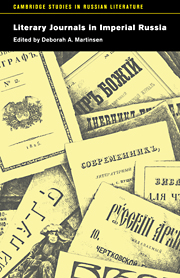Book contents
- Frontmatter
- Contents
- Notes on contributors
- Acknowledgements
- 1 Introduction
- PART I EIGHTEENTH CENTURY
- PART 2 EARLY NINETEENTH CENTURY
- PART 3 MID NINETEENTH CENTURY
- PART 4 SILVER AGE
- 9 Rise and decline of the “literary” journal: 1880–1917
- 10 The literary content of The World of Art
- 11 Northern Herald: from traditional thick journal to forerunner of the avant-garde
- 12 Chekhov and the journals of his time
- List of titles of journals and almanacs
- Select bibliography
- Index
- CAMBRIDGE STUDIES IN RUSSIAN LITERATURE
11 - Northern Herald: from traditional thick journal to forerunner of the avant-garde
Published online by Cambridge University Press: 11 March 2010
- Frontmatter
- Contents
- Notes on contributors
- Acknowledgements
- 1 Introduction
- PART I EIGHTEENTH CENTURY
- PART 2 EARLY NINETEENTH CENTURY
- PART 3 MID NINETEENTH CENTURY
- PART 4 SILVER AGE
- 9 Rise and decline of the “literary” journal: 1880–1917
- 10 The literary content of The World of Art
- 11 Northern Herald: from traditional thick journal to forerunner of the avant-garde
- 12 Chekhov and the journals of his time
- List of titles of journals and almanacs
- Select bibliography
- Index
- CAMBRIDGE STUDIES IN RUSSIAN LITERATURE
Summary
The Petersburg-based literary and political monthly Northern Herald (Severnyi vestnik) published its first issue in September 1885 and thirteen years later, in December 1898, issued its last. Throughout its tenure many of Russia's major writers, scholars, and thinkers published on its pages, constituting perhaps the most curious and unlikely array of figures ever assembled in a single publication. Uspensky, Merezhkovsky, Mikhailovsky, Mendeleev, Leskov, Tolstoy, Miklukho-Maklai, Minsky, Gippius, Sologub, Gorky, Chekhov, Diaghilev – people of the most diverse opinions and intellectual temperaments – had their work printed in this periodical. Having begun in the tradition of a “thick journal” with a moderately populist-progressivist cast, it became, from the early nineties, the major organ for the literary movement known as Symbolism, thereby occupying a special place in the history of what has come to be known as the “Silver Age” of Russian culture. Beginning in 1891, Northern Herald systematically published the works of the first Russian Symbolists, preceding by several years Briusov's Moscow-based volumes, Russian Symbolists. The journal served, in the words of its most learned chronicler, P. V. Kupriianovsky, as a “laboratory of early Russian symbolism.” And for as much as Valery Briusov is credited with the founding of this artistic school, “his significance in the development of the symbolism of the nineties,” Kupriianovsky argues, “cannot be compared to the role of Northern Herald.” Indeed, Briusov himself recognized the unquestionable value of Northern Herald.
- Type
- Chapter
- Information
- Literary Journals in Imperial Russia , pp. 207 - 227Publisher: Cambridge University PressPrint publication year: 1998



